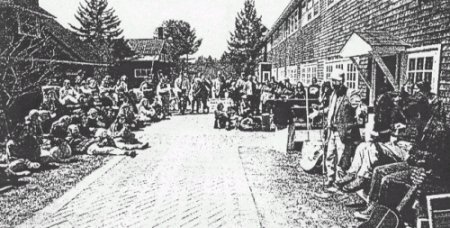
Mark Greenberg addresses a group of protesters at Goddard Thursday.
by Robert Piasecki - Times Argus Staff
PLAINFIELD -- More than 100 students, faculty members, staff, and alumni called for the resignation of Goddard College president Richard Greene, during a 1960s style rally at the school Thursday.
The protesters claimed Greene is threatening the tradition of democracy and collaboration that Goddard was founded on 68 years ago, and that he is also trying to turn the college into a generic cookie cutter corporate institution.
After listening to a band play a song titled the "Goddard Blues," a parade of speakers took to a makeshift stage to denounce Greene and his administration.
Likening their struggles against Greene to the anti-war and civil rights movement of the 1960s, the speakers said the time has come for Goddard to get rid of its current administrative structure, and replace it with one that is similar to a Vermont Town Meeting.
Manuel O'Neill, the financial aid director at the college, told the audience Goddard needs a president of acts like a facilitator in a democratic collaborative decision-making process.
Declaring himself an anarchist, faculty member Richard Schramm said Goddard doesn't need its current hierarchical administrative structure.
"Goddard should not be run by a set of boxes. We want an administration that is directly responsible to the community," Schramm said.
Under the school's current administrative structure, Schramm said Greene is responsible to a Board of Trustees, but the trustees are not accountable to anyone.
"What we need is a sharing of governance," Schramm said.
Andrew Dinkelaker, a student at Goddard who is a member of the college's 25 member Board of Trustees, agreed with Schramm.
Dinkelaker said the trustees are not accountable to the students and the community at Goddard.
The college needs to move to a new administrative model that is based on self-government, Dinkelaker said.
Dinkelaker also demanded that the trustees take a position on Greene as soon as possible.
Goddard's trustees have not issued a statement about Greene since protests against him began over two weeks ago after the college's admissions director resigned.
But Greene, who did not attend yesterday's rally, said he assumes the trustees support him and he expects they will release a statement very soon.
Greene, said he has no intention of stepping down, despite two votes of no-confidence by faculty and students at the college.
"I was hired to bring Goddard to another level, to return it to being a national leader in progressive education, and that's what I intend to do," Greene said in an interview while yesterday's rally was going on.
Greene strongly disputed allegations that he is not following Goddard's mission statement and governance document.
"I only want to change certain aspects to fulfill the college's mission," he said.
Greene said getting rid of Goddard's current administrative structure could lead to the college losing its accreditation.
Three years ago a visiting committee from the New England Association of Schools and Colleges, the crediting organization in the region, said Goddard faces extraordinary difficulties because a "continuing conflicts over recognized authority and decision-making roles."
"Developing effective governance continues to be extraordinary challenge for the college," the association said.
The association noted that Goddard has adopted and rejected three governance systems and that debate about governance has been continuous during that time.
The organization said Goddard needed to clearly defined the authority, responsibilities, and relationships among the governing board, administration, staff, and faculty.
Greene said that contrary to what his critics say, Goddard College is in good shape financially.
Goddard had a $114,000 surplus in its budget last year and fundraising at the college is up 21 percent this year, Greene said.
A budget gap caused by a shortfall in enrollment has created a situation that might require some layoffs or changes, Greene said.
But some members of Goddard's community aren't willing to change to deal with the problem, Greene said. Instead Greene said they are working to keep the status quo.
For example, Greene said instructional costs and Goddard has increased 160 percent over the past five years while enrollment has gone up only 20 percent.
That has caused Greene to take a hard look at what the teaching load is for the faculty at Goddard.
A consultant recently determined that Goddard's on-campus faculty teach two courses a semester and advise 12 students, Greene said.
Greene said he wants Goddard to have a full-time faculty that are full-time teachers.
But so far Greene said his efforts to achieve that goal have been met with stiff resistance.
GODDARD GROUP GATHERS TO DENOUNCE GREENE

